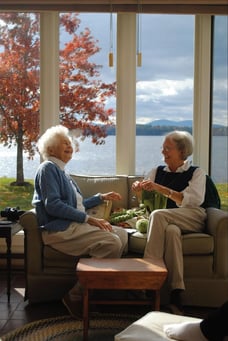
America's nursing homes are in crisis. Older and infirmed Americans are being housed in nursing homes that are, at best, underfunded and struggling, or at worse, are pinching pennies at the expense of quality health care. In either event, changes need to happen. Sadly, many of the laws and rules forming the foundation of nursing home care today are based on outdated laws from a time when we expected far less health care.
Here, we'll discuss ten of the most significant areas affecting nursing homes. We'll look at places where adjustments and innovations are needed to provide seniors with the level of care they deserve.
Related: What are the Growing Trends in Water Conservation
Top 10 Ways to Improve Nursing Homes & Lower Costs
While the situation is dire, it isn't hopeless. Reforms can dramatically improve nursing homes and create long-term care facilities we're proud of and where our seniors and affirmed may be safe and happy.
1 Partner with Hospitals
Residents of nursing homes are often in need of acute medical care. Nursing homes forging partnerships with hospitals can improve the safety of patients transitioning between care facilities and reduce hospital readmissions. Partnerships between these facilities can be beneficial to both.
In times of crisis, as we experienced during COVID-19, nursing homes that worked closely with hospitals could provide ample testing and avoid widespread infections among residents. Further, partnered nursing homes benefited from hospitals' rapid-response teams when infections did occur.
2 More Registered Nurses
As most nursing homes are either running on shoestring budgets or are being financially strangled by corporate interest, they are severely understaffed. In particular, registered nurses (RN) are in short supply in nursing homes.
Federal law only requires a registered nurse on staff for eight consecutive hours per day, leaving sixteen hours without one. Many nursing homes can't even meet this requirement. Unfortunately, this means many seniors are not receiving the necessary medical care, and some are neglected and abused.
Nurse burnout and low pay have caused many to leave the industry. The advanced skill set of RNs can bring up the level of health care for residents of nursing homes.
Related: 4 Reasons U.S. Cities Are Facing Water Infrastructure Problems
Are you a landlord concerned about lowering costs for your property? Visit us to see how you can detect leaks in your property. Check out The Water Scrooge today!
3 More Effective Infection Control
As we saw during COVID-19, nursing homes can be hotbeds for infection. While many long-term care facilities managed well during that health crisis, many others were woefully unsafe for residents and staff alike.
Of course, senior residents have weakened immune systems and, hence, are more prone to become ill. Chronic diseases, age, and close living quarters are all ideal conditions for the spread of infections.
Education on infection control and stringent adherence to basic (and not-so-basic) practices can go a long way in preventing the spread of infection.
4 Save Money in the Right Areas
Instead of cost-cutting measures compromising the safety and welfare of residents, consider saving money in other ways. For instance, water consumption in care homes is far above other facilities. Water consumption for one room in a nursing home can be up to 200 gallons of water per day or 40,000 gallons per year!
Fortunately, there are ways to save water and cut operating costs. The Water Scrooge can help make changes to toilets, showers, and other water flow management systems that save significantly on the cost of water.
5 Reduce Resident Room Crowding
Many nursing homes crowd residents into rooms where they don't have the privacy or space they need. When residents are crowded, two or three in a room, they are robbed of dignity and comfort. Unfortunately, many nursing homes must do this for financial reasons despite residents preferring to be roomed privately. This needs to be phased out in favor of single-occupancy rooms.
6 Create Safeguards Against Unnecessary Medications
In long-term care facilities, there needs to be a reduction in misdiagnoses and prescribing of antipsychotic drugs. We need to identify these diagnoses and make a real effort to stop them. Many of these errors may come down to poorly trained or inadequately qualified nursing home staff. Staff must be educated on proper medication administration and overseen to ensure compliance.
7 Address Overworked Staff
Shockingly, one nursing home aide can have responsibility for more than 20 residents on one shift. When we consider the physical and emotional demands of caring for seniors and the affirmed, there is little chance these residents are receiving adequate care.
Requirements for nursing home staff vary from state to state, but most must undertake a hands-on training course (of 75 hours to 3 months) and a certified nursing assistant program (CNA). Before you become impressed, recognize that hairstylists must meet even more demanding standards. Improved training and higher staffing levels can mean more pay for dedicated workers.
8 Better Oversight and Reporting
When serious issues arise in nursing homes, often, there isn't enough oversight to recognize and report errors. Despite seemingly adequate rules and regulations to protect staff and residents in care facilities, these are not strictly enforced. As terrible as it sounds, many nursing homes look the other way because although a loss of life and subsequent fines are challenging, they don't equate to the cost-savings of maintaining the status quo.
9 Rethink Current Nursing Home Models
Taking the current model of nursing homes and recreating them to be smaller and more home-like facilities will go a long way to better and more focused care. Smaller nursing homes can oversee low-care residents in up-to-date facilities where they can feel safe, protected, and well-cared for.
Related: The Landlord's Definitive Guide to Minimizing Operating Costs
10 Provide More Care At Home
We know that nursing homes are largely underfunded and underregulated and are negatively impacted by social stigma. Many residents are considered 'low care,' which means they only need minimal support with daily living. These people don't have serious diseases or require complex medication plans. An excellent solution is an extension of home care services. Medicare funds for nursing home care can be more easily applied to in-home care for more people.
Are you a property investor looking for a way to detect leaks early and cut waste? Our Toilet Leak Prevention Valve is what you've been looking for. Visit The Water Scrooge today!

